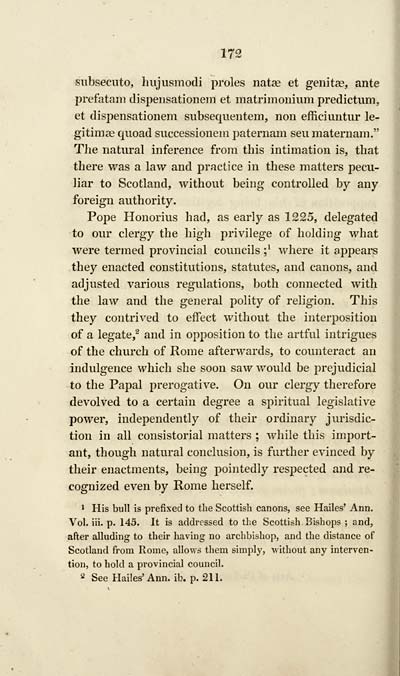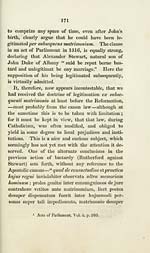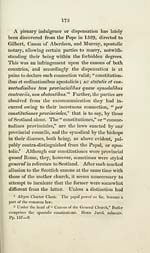Tracts, legal and historical
(188) Page 172
Download files
Complete book:
Individual page:
Thumbnail gallery: Grid view | List view

172
subsecuto, hujusmodi proles natas et genitae, ante
prefatam dispensationem et matrimonium predictum,
et dispensationem subsequentem, non efficiuntur le-
gitimse quoad successionein paternam seu maternam."
The natural inference from this intimation is, that
there was a law and practice in these matters pecu-
liar to Scotland, without being controlled by any
foreign authority.
Pope Honorius had, as early as 1225, delegated
to our clergy the high privilege of holding what
were termed provincial councils ; L where it appeal's
they enacted constitutions, statutes, and canons, and
adjusted various regulations, both connected with
the law and the general polity of religion. This
they contrived to effect without the interposition
of a legate, 2 and in opposition to the artful intrigues
of the church of Rome afterwards, to counteract an
indulgence which she soon saw would be prejudicial
to the Papal prerogative. On our clergy therefore
devolved to a certain degree a spiritual legislative
power, independently of their ordinary jurisdic-
tion in all consistorial matters ; while this import-
ant, though natural conclusion, is further evinced by
their enactments, being pointedly respected and re-
cognized even by Rome herself.
1 His bull is prefixed to the Scottish canons, see Hailes' Ann.
Vol. iii. p. 145. It is addressed to the Scottish Bishops ; and,
after alluding to their having no archbishop, and the distance of
Scotland from Rome, allows them simply, without any interven-
tion, to hold a provincial council.
2 See Hailes' Ann. ib. p. 211.
subsecuto, hujusmodi proles natas et genitae, ante
prefatam dispensationem et matrimonium predictum,
et dispensationem subsequentem, non efficiuntur le-
gitimse quoad successionein paternam seu maternam."
The natural inference from this intimation is, that
there was a law and practice in these matters pecu-
liar to Scotland, without being controlled by any
foreign authority.
Pope Honorius had, as early as 1225, delegated
to our clergy the high privilege of holding what
were termed provincial councils ; L where it appeal's
they enacted constitutions, statutes, and canons, and
adjusted various regulations, both connected with
the law and the general polity of religion. This
they contrived to effect without the interposition
of a legate, 2 and in opposition to the artful intrigues
of the church of Rome afterwards, to counteract an
indulgence which she soon saw would be prejudicial
to the Papal prerogative. On our clergy therefore
devolved to a certain degree a spiritual legislative
power, independently of their ordinary jurisdic-
tion in all consistorial matters ; while this import-
ant, though natural conclusion, is further evinced by
their enactments, being pointedly respected and re-
cognized even by Rome herself.
1 His bull is prefixed to the Scottish canons, see Hailes' Ann.
Vol. iii. p. 145. It is addressed to the Scottish Bishops ; and,
after alluding to their having no archbishop, and the distance of
Scotland from Rome, allows them simply, without any interven-
tion, to hold a provincial council.
2 See Hailes' Ann. ib. p. 211.
Set display mode to:
![]() Universal Viewer |
Universal Viewer | ![]() Mirador |
Large image | Transcription
Mirador |
Large image | Transcription
Images and transcriptions on this page, including medium image downloads, may be used under the Creative Commons Attribution 4.0 International Licence unless otherwise stated. ![]()
| Histories of Scottish families > Tracts, legal and historical > (188) Page 172 |
|---|
| Permanent URL | https://digital.nls.uk/95036262 |
|---|
| Description | A selection of almost 400 printed items relating to the history of Scottish families, mostly dating from the 19th and early 20th centuries. Includes memoirs, genealogies and clan histories, with a few produced by emigrant families. The earliest family history goes back to AD 916. |
|---|

